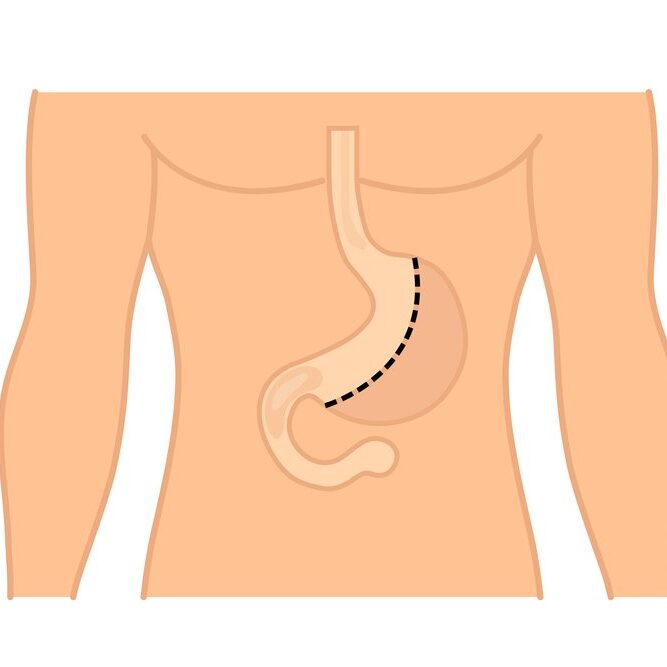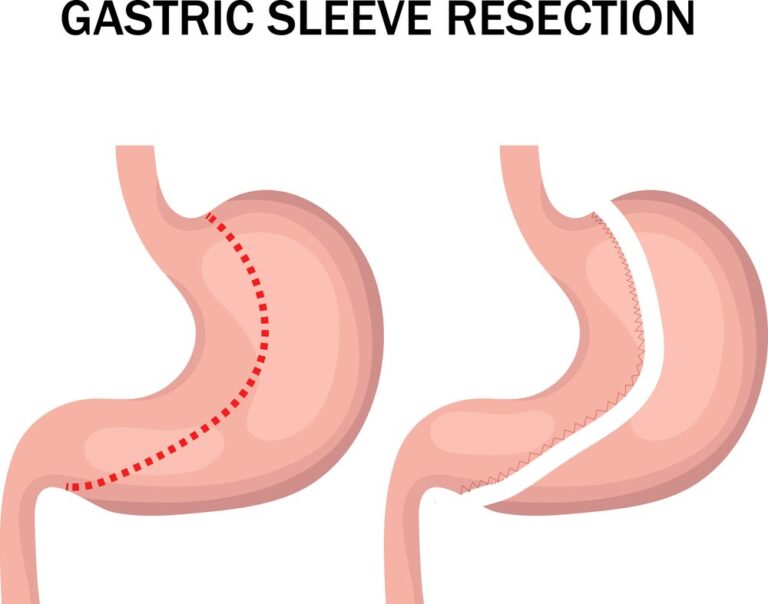Lap band revision to gastric sleeve surgery, also known as lap band removal and conversion to gastric sleeve, is a surgical procedure that involves removing the lap band and converting the stomach into a sleeve-shaped pouch. It’s important to have a thorough consultation with a qualified healthcare provider who specializes in bariatric surgery to determine if lap band revision to gastric sleeve is the right option for you.
Get a $1000 Off on Gastric Sleeve in Miami
Overview of Lap Band Surgery and Its Potential Issues
Lap band surgery, also known as adjustable gastric banding, is a weight loss procedure that involves placing an adjustable silicone band around the upper part of the stomach. While lap band surgery can be effective for some individuals, it’s important to be aware of potential issues and considerations. Here’s an overview:
- Procedure: Lap band surgery is performed laparoscopically, using small incisions. The adjustable band is placed around the upper part of the stomach, creating a smaller pouch. This restricts the amount of food that can be consumed, leading to weight loss.
- Weight loss: Lap band surgery can help individuals achieve significant weight loss over time. However, the amount of weight loss can vary, and consistent follow-up with healthcare providers is crucial for successful outcomes.
- Adjustments: The lap band is adjustable, allowing healthcare providers to modify its tightness by injecting or removing saline solution through a port placed under the skin. Adjustments may be necessary over time to optimize weight loss and manage any issues that arise.
- Potential issues: Some potential issues associated with lap band surgery include:
- Band-related complications: These can include band slippage, erosion, or infection, which may require additional surgery or band removal.
- Food intolerance: Some individuals may experience difficulty tolerating certain foods or may require more time to chew food thoroughly due to the restricted stomach size.
- Weight loss plateau: Weight loss may plateau after a certain period, requiring further interventions or adjustments to continue progress.
- Gastroesophageal reflux: In some cases, lap band surgery can contribute to acid reflux or worsen existing reflux symptoms.
- Lifestyle changes: To achieve successful weight loss and maintain long-term results, adopting healthy lifestyle habits is essential. This includes following a balanced diet, incorporating regular physical activity, and addressing any underlying emotional or psychological factors related to eating habits.
It’s crucial to have a comprehensive consultation with a qualified healthcare provider specializing in bariatric surgery to discuss the potential benefits, risks, and alternatives of lap band surgery. They can provide personalized guidance, monitor your progress, and address any concerns throughout your weight loss journey.

Reasons for Considering Lap Band Revision to Gastric Sleeve
There are several reasons why individuals may consider lap band revision to gastric sleeve surgery. Here are some common reasons:
- Inadequate weight loss: Lap band surgery may not provide the desired weight loss results for some individuals. If significant weight loss has not been achieved or weight regain occurs over time, a revision to gastric sleeve surgery may be considered to enhance weight loss outcomes.
- Complications or discomfort: Lap band surgery can be associated with complications such as band slippage, erosion, infection, or intolerance to the band. These issues can cause discomfort, difficulty eating, or hinder weight loss progress, leading individuals to seek revision to gastric sleeve as a more effective and sustainable solution.
- Desire for more significant weight loss: Gastric sleeve surgery typically results in greater weight loss compared to lap band surgery. Individuals who desire more substantial weight loss may choose to undergo a revision to gastric sleeve for enhanced results.
- Improved management of comorbidities: Gastric sleeve surgery has been shown to have positive effects on obesity-related health conditions such as type 2 diabetes, high blood pressure, and sleep apnea. If the lap band has not effectively improved or resolved these comorbidities, a revision to gastric sleeve surgery may be considered for better management.
- Personal preference: Some individuals may prefer the simplicity and effectiveness of gastric sleeve surgery over the adjustable nature of the lap band. They may choose to undergo a revision to gastric sleeve to have a more permanent and reliable weight loss solution.
It’s important to consult with a qualified healthcare provider specializing in bariatric surgery to discuss your specific circumstances, goals, and any concerns you may have regarding lap band revision to gastric sleeve.
Preparing for Lap Band Revision Surgery
Preparing for lap band revision surgery involves several important steps to ensure a successful procedure and smooth recovery. Here are some key aspects to consider:
- Consultation with a healthcare provider: Schedule a consultation with a qualified healthcare provider who specializes in bariatric surgery and lap band revision. They will evaluate your individual case, discuss your goals and expectations, and determine if you are a suitable candidate for the procedure.
- Medical evaluation: Undergo a comprehensive medical evaluation, which may include physical examinations, laboratory tests, and imaging studies. This evaluation helps assess your overall health and identify any potential risks or underlying medical conditions that may need to be addressed before the surgery.
- Nutritional assessment: Work with a registered dietitian to assess your nutritional status and ensure that you are adequately prepared for surgery. They may provide dietary recommendations and guidance to optimize your nutritional intake before and after the procedure.
- Weight loss and lifestyle modifications: Depending on your specific circumstances, your healthcare provider may recommend weight loss and lifestyle modifications prior to lap band revision surgery. This may involve adopting a healthier diet, increasing physical activity, and addressing any emotional or psychological factors related to eating habits.
- Pre-operative instructions: Follow your healthcare provider’s pre-operative instructions carefully, which may include fasting guidelines, medication adjustments, and lifestyle modifications. Adhere to these instructions to minimize potential risks and optimize your readiness for surgery.
- Psychological evaluation: Some healthcare providers may request a psychological evaluation to assess your mental and emotional readiness for lap band revision surgery. This evaluation helps identify any potential psychological factors that may impact the success of the procedure and your post-operative recovery.
- Support system: Establish a strong support system that includes family, friends, and healthcare professionals who can provide guidance, encouragement, and assistance throughout your lap band revision journey.
It’s important to communicate openly with your healthcare provider, ask any questions or concerns you may have, and follow their guidance throughout the pre-operative preparation process.

Surgical Procedure: Lap Band Removal and Gastric Sleeve Conversion
The surgical procedure for lap band removal and gastric sleeve conversion, also known as lap band revision to gastric sleeve, involves several key steps. Here is an overview of the process:
Surgical Procedure: Lap Band Removal and Gastric Sleeve Conversion
- Anesthesia: General anesthesia is administered to ensure comfort and unconsciousness during the procedure.
- Laparoscopic approach: Multiple small incisions are made in the abdomen for the insertion of surgical instruments and a laparoscope.
- Lap band removal: The lap band and associated components are carefully removed, and the incisions created for the lap band are reopened.
- Gastric sleeve creation: A large portion of the stomach is removed, leaving a smaller, tubular-shaped pouch known as a gastric sleeve.
- Suturing and closure: Incisions are closed with sutures or staples to promote proper wound healing and minimize scarring.
- Post-operative care: Close monitoring, pain medication, intravenous fluids, and specific instructions on diet, physical activity, pain management, and follow-up appointments are provided.
- Recovery and follow-up: Hospital stay may last a few days, and a gradual transition from liquid to solid foods is typically implemented. Regular follow-up appointments are scheduled for monitoring and support.
It’s essential to have detailed discussions with your healthcare provider to fully understand the surgical procedure, its potential risks, benefits, and the specific guidelines that apply to your situation.
Recovery and Post-Surgery Guidelines
The recovery period after lap band revision to gastric sleeve surgery is crucial for successful healing and long-term outcomes. Here are some general post-surgery guidelines to follow:
| Recovery and Post-Surgery Guidelines |
|---|
| 1. Hospital stay |
| – Typically a few days for close monitoring and post-operative care. |
| 2. Pain management |
| – Follow prescribed medication instructions for pain relief. |
| 3. Fluid intake |
| – Begin with clear liquids and gradually transition to a full liquid diet. |
| 4. Diet progression |
| – Follow healthcare provider’s guidance on transitioning to pureed and solid foods. |
| 5. Physical activity |
| – Engage in light activity as advised by healthcare provider. |
| 6. Incision care |
| – Keep incisions clean and dry, following healthcare provider’s instructions. |
| 7. Follow-up appointments |
| – Attend all scheduled appointments for monitoring and adjustment of recovery plan. |
| 8. Emotional support |
| – Seek support from family, friends, or support groups for emotional well-being. |
Please note that these guidelines are general, and it’s important to follow the specific instructions provided by your healthcare team for a successful recovery.
Weight Loss Potential and Improved Health Outcomes
Gastric sleeve surgery, also known as sleeve gastrectomy, is a weight loss procedure that can lead to significant improvements in health outcomes. Here are some key points regarding weight loss potential and the positive effects on overall health:
- Weight loss: Gastric sleeve surgery is highly effective in promoting weight loss. On average, individuals can expect to lose 50% to 70% of their excess body weight within the first year after surgery. The weight loss continues gradually over the following months, leading to long-term sustained weight reduction.
- Health benefits: Significant weight loss achieved through gastric sleeve surgery can result in numerous health improvements, including:
- Obesity-related health conditions: Many obesity-related health conditions, such as type 2 diabetes, high blood pressure, sleep apnea, and joint pain, can be significantly improved or even resolved after gastric sleeve surgery.
- Cardiovascular health: Weight loss decreases the risk factors associated with cardiovascular diseases, such as high cholesterol and triglyceride levels, thereby reducing the risk of heart disease and stroke.
- Improved mobility: Losing excess weight can enhance mobility, reduce joint pain, and improve overall physical function, leading to a more active and fulfilling lifestyle.
- Psychological well-being: Weight loss can boost self-esteem, body image, and overall psychological well-being, positively impacting mental health and quality of life.
- Metabolic changes: Gastric sleeve surgery affects hormones and metabolic processes in the body. The procedure alters the size of the stomach, resulting in reduced food intake and changes in appetite-regulating hormones. This can lead to decreased hunger, increased satiety, and improved portion control.
- Long-term success: Maintaining long-term weight loss requires a commitment to adopting a healthy lifestyle, including regular physical activity and a balanced diet. Following the guidelines provided by your healthcare team, attending follow-up appointments, and engaging in a support system can significantly contribute to long-term success.
Importance of Regular Follow-Up Visits and Monitoring
Regular follow-up visits and monitoring play a crucial role in the success of gastric sleeve surgery and the overall well-being of individuals. Here’s why they are important:
- Monitoring weight loss progress: Follow-up visits allow healthcare providers to track your weight loss progress and assess whether you are on track to achieve your goals. They can provide guidance and make necessary adjustments to your treatment plan based on your individual needs.
- Identifying and addressing complications: Regular monitoring helps healthcare providers identify any potential complications or issues that may arise after surgery. Early detection allows for prompt intervention and management, minimizing the impact on your health and well-being.
- Nutritional assessment and support: Follow-up visits provide an opportunity for nutritional assessment to ensure you are meeting your nutritional needs and making healthy dietary choices. Healthcare providers can offer guidance on maintaining a balanced diet and may recommend nutritional supplements if necessary.
- Adjusting medications: With weight loss and improved health, medication needs may change. Follow-up visits allow healthcare providers to review your medication regimen, adjust dosages if needed, and ensure that medications are properly managed in light of your new health status.
- Monitoring comorbidities: Regular monitoring helps healthcare providers evaluate the impact of gastric sleeve surgery on obesity-related health conditions, such as diabetes, high blood pressure, and sleep apnea. They can assess improvements, adjust treatment plans if necessary, and provide ongoing management of these conditions.
- Providing ongoing support: Follow-up visits offer an opportunity to address any questions, concerns, or challenges you may be experiencing. Healthcare providers can offer support, motivation, and resources to help you stay on track with your weight loss and overall health goals.
- Sustaining long-term success: Gastric sleeve surgery is a lifelong commitment. Regular follow-up visits help ensure that you maintain the lifestyle changes necessary for long-term success. They provide accountability, reinforcement of healthy habits, and encouragement to continue making positive choices.
By attending regular follow-up visits and staying engaged with your healthcare team, you can receive the necessary support, monitoring, and guidance to optimize your weight loss journey and maintain your overall health and well-being after gastric sleeve surgery.
References:
- Chen, Y., Dallal, R.M., & Mattar, S.G. (2023). Benefits of Converting Lap-Band to Gastric Sleeve. WebMD. Retrieved June 6, 2020
- Williams, B. (2023). Why Lap Band Patients Opt for Revision to Gastric Sleeve Surgery. Mayo Clinic. Retrieved June 6, 2022






